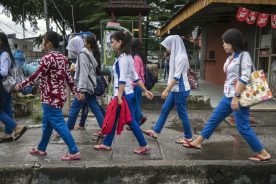Ten years have passed since the signing of the Vietnam–Saudi Arabia Bilateral Labour Agreement (BLA) in 2014, which governed the sending of women from Vietnam to do domestic work under the Kafala system, a visa sponsorship system common in Saudi Arabia and other Gulf countries—one that gives the workers’ kafeel (head of household and employer) complete control over the lives of these female domestic workers. In 2019, both governments quietly renewed this 5-year bilateral agreement without any public announcement. The agreement is up for renewal in 2024.
The secrecy around the 2019 renewal was prompted by bad publicity, both local and global, dating back to the launch of the BLA in 2014. Only a year after the 2014 agreement, Vietnamese labour newspapers had already reported violations of its terms on the part of Vietnamese recruitment companies and governmental agencies.
These newspapers delineated grievances and petitions that exposed the hardships and abuses endured by workers in Saudi Arabia. Between 2019 and 2022, a flurry of reports brought to light violations of domestic women workers’ rights in Saudi Arabia, which came from various sources: Vietnamese labour newspapers, a UN special report on human trafficking in Vietnam, and independent international scholars.
As contract violations continued through the outbreak of the COVID-19 pandemic in 2020, many workers’ spouses and family members went to the local newspapers to demand the return of their loved ones who had already finished their two-year contracts in Saudi Arabia but had been caught in lockdowns with no way to get home. No workers’ pleas were answered by the Vietnamese Embassy; and the Kafala foreign worker system left it to the kafeels to determine these women workers’ fates. But it was the death of an underage woman in 2021, which culminated in the UN special report on human trafficking in Vietnam, that shocked the world.
Social media videos reproduced by media outlets showed H Xuân Siu, a member of the Jarai ethnic minority, pleading with the Labour Attaché stationed at Vietnam’s embassy in Riyadh for help in escaping repeated physical beatings to her head by the female employer which caused unconsciousness several times—but to no avail. She reached out specifically to VINACO, the recruitment company that sent her there, as well as to the two Vietnamese labour attachés at the Vietnamese Embassy in Riyadh, about her excruciating pain and the need for water, but no one came to her rescue. Other local newspapers picked up and exposed these abuses.
The fragile freedom for the Vietnamese media to report on these abuses ended at the end of 2021 after these exposures of labour violations in Saudi Arabia negatively affected Vietnam’s stature on the global stage. In the US Department of State’s 2022 Trafficking-In-Persons (TIP) report Vietnam was downgraded to Tier 3, the lowest possible ranking, in the report’s assessment of its compliance with basic measures to combat human trafficking. This downgrade has had negative financial implications for the Vietnamese state and led to the sudden discharge of the two Department of Labour officials at the Vietnamese Embassy in Riyadh. Since 2021, the Vietnamese government has placed an unofficial gag order on the media coverage of labour violations in Saudi Arabia, to protect the Vietnamese state’s image. It is possible that the lack of exposé reportage to the rest of the world brought Vietnam back up to Tier 2 Watch List in the 2023 TIP report.
The purpose of this article is to raise awareness and to call for action to fix the gaping hole of this BLA before it is renewed in 2024 for another five years. What’s still missing, after ten years of the agreement, is the establishment of a Standard Employment Contract (SEC) for Vietnamese workers that was required to be created and signed at the onset of this 2014 BLA by the four key stakeholders—the Vietnamese worker and the Vietnamese recruitment company, and the Saudi kafeel and the Saudi recruitment company).
The goal should be to hold these stakeholders responsible to implement and comply with the rights and responsibilities of workers and employers. While this requirement was clearly stipulated in Item #8 of the 2014 BLA, it has never been implemented. Meanwhile, the key state agencies—the Department of Overseas Labour (DoLAB) and Vietnam Association of Manpower Supply (VAMAS)—continue to be silent after numerous inquiries, outreach, and public outrage.
The failure of establishing the required SEC, ten years after the signing of the 2014 BLA, is directly linked to sustaining structural violence in order to benefit the two governments and their recruitment companies, at the expense of the Vietnamese domestic workers. Without any oversight, the long-overdue SEC is even more urgent, now that the BLA is about to be renewed again.
Structural violence explained
To understand the structural violence Vietnamese migrant workers are subjected to, we need to understand the interconnection of the BLA with the Kafala system, and the shared interests of state officials and recruitment companies in both countries that sustain an exploitative transnational labour system.
Kafala visa sponsorship system is prevalent throughout the six countries in the Gulf Cooperation Council (GCC). In this system, the heads of household (cum employers) control foreign workers’ entry visas, residence permits as well as exit permits. Under the Saudi Arabian Kafala system, the Saudi government transferred the responsibility of monitoring foreign domestic workers to the Saudi Domestic Recruitment Office, which in turn transfers power to the Saudi kafeel who have complete authority to manage and benefit from the labour of their foreign domestic workers. Moreover, the domestic workers are tied to the original sponsors who can deport them if they are not pleased with the workers’ service. My research has found that these kafeel transferred the Vietnamese workers to many households that were not on the original contracts.
In September 2014, the two deputy labour ministers in Vietnam and Saudi Arabia signed this 5-year BLA to send Vietnamese women to work as domestic workers in the homes of the Saudi families, with an automatic renewal clause. In the wake of the renewal in 2019 for another five years, VAMAS decided on 17 December 17 2020 to form the Department on the Middle East Domestic Help Market and appointed its leaders. (The literal translation of VAMAS in Vietnamese is the Association to Export Labor from Vietnam (Hiệp Hội Xuất Khẩu Lao Động Việt Nam).
Related

Economic redistribution should start from giving workers bargaining power long denied to them.
But unbeknownst to the general public, the top five leaders of this department are directors and presidents of recruitment companies that were tainted with corruption and bad reputations after leaving workers stranded and exploited in Saudi Arabia during the COVID-19 crisis. In particular, VINACO, the recruitment company that sent the underage Jrai ethnic minority female worker who died in Saudi Arabia (discussed above), is still in power. My research has found that Thuận An DMC (formerly known as Vĩnh Cát) continues to operate even with many labour violations. These companies, represented by VAMAS’ Code of Conduct and vetted by the ILO office in Vietnam, continue to enjoy their powers without any penalty or oversight of their violations. VINACO’s actions, in particular, have been the opposite of the Code of Conduct to which it subscribes.
Four years have passed, and these same leaders continue to lead this department. It is long overdue to establish oversight to make them accountable for their actions.
At the top level, the Vietnamese state—acting effectively as a labour brokerage state—works alongside the Saudi Kafala system under which migrant domestic workers are employed. While in Saudi Arabia, the Saudi Kafala system supersedes the BLA, reigning supreme by confiscating workers’ passports as soon as they set foot in Saudi Arabia, controlling workers’ entry visas, residence permits and exit permits. A 2018 Human Rights Watch report found that recently introduced reforms to migrant labour conditions in Saudi Arabia do not apply to domestic workers, who continued to endure passport confiscations, physical and sexual abuse, and are prohibited from joining trade unions or striking.
Structural violence is stable because there is no official oversight to monitor the implementation of the BLA. The Saudi Recruitment Office works directly with the kafeel, who apply for all the visas to sponsor and control each domestic worker. The Vietnamese Ministry of Labour, Invalids, and Social Affairs (MoLISA) grants licenses to recruitment companies that go to poor areas in Vietnam to recruit workers. The Department of Overseas Labour (DoLAB), housed in the Vietnamese Embassy in Riyadh, is supposed to work closely with VAMAS to resolve Vietnamese workers’ grievances while working overseas. All of them have turned a blind eye to repeated complaints lodged by the Vietnamese workers there. This system protects notoriously corrupt recruitment companies, which target not only women in poor rural parts of Vietnam’s north-central provinces, but also ethnic minorities in the central highlands.
The ILO office in Hanoi has been providing technical assistance to MoLISA and DoLAB and working closely with VAMAS, but turning a blind eye to the bad “Code of Conduct” of many VAMAS member recruitment companies that failed to protect workers in Saudi Arabia. Inside the kafeel’s homes, most of these female workers suffer, as unfree labour, from being transferred from one house to another (which is not allowed under the BLA), resulting in precarity, loss of pay, cycle of debt, and dispossession of their rights. (I have reached out to the ILO’s office in Hanoi but received no response. I have also communicated numerous times with some ILO staff, specifically about the status of this standardised employment contract form, to no avail.)
New narratives from the Vietnamese state
What we see now as the 2024 renewal of the BLA is imminent, are the new narratives of the Vietnamese state, focusing on trade and investment and export of high-skilled workers. Since 2022, the official narratives have been promoting bilateral agreements between Vietnam and Saudi Arabia on trade and investment. In particular, Saudi Arabia has wanted to import 10 million more foreign temporary workers from many countries—including Vietnam—especially in the areas of manufacturing industries, energy, health, and tourism. The BLA has focused on two-way tourism, the export of Vietnamese halal food products to Saudi Arabia, and the use of renewable energy. While Saudi Arabia has been exporting primarily chemical-related products, such as plastics and liquefied petroleum gas, Vietnam has primarily exported mobile phones, agricultural products such as rice, cashew nuts, fruits and vegetables.
Moreover, directives coming from the prime minister and various ministries (labour, trade, and industry) have been focusing on training skilled workers to go to work in the Middle East (Saudi Arabia). In particular, MoLISA has stressed the importance of “selecting good employers, good contracts that are suitable to Vietnamese workers, and using professional skill sets of the workers as a basis for negotiations in order to raise the salary and other rights and benefits for workers.” The response of recruitment companies belonging to VAMAS pledges compliance with their leaders’ directives:
We acknowledge the Minister’s leading recommendation and pledge to develop the Middle East (labour) market according to the essence of the directive of “not sending workers there at all costs” but instead focusing on training workers and assessing and selecting carefully [Saudi] counterparts, providing contract, supporting and managing workers during the time they work overseas, in order to ensure their labour rights.
But how about the working and living conditions of the mostly low-skilled workers, especially the women who work as domestics behind closed doors, unseen and unacknowledged, in the houses of their kafeel employers? As of October 2023, there were still about 5,000 Vietnamese workers in Saudi Arabia doing masonry, construction, mechanics, domestic work, chauffeuring; a few are engineers and professionals. But there is no information in official news outlets or government notices, reports, or any other publicly available databases about the working conditions of these mostly low-skilled temporary workers.
Conclusion
It is ironic that over 5,000 export workers in Saudi Arabia are not accounted for on the list of exports from Vietnam, proudly accompanying the Vietnamese prime minister’s announcement of trade and investment talks with Saudi Arabia.
Vietnam can learn from good practices in the case of the Philippines and Cambodia. These two countries signed their BLAs with Saudi Arabia in 2013 and 2016 respectively. But these two countries immediately protected their workers by creating and using the Standard Employment Contract for their domestic workers in the same year that each country signed the BLA with Saudi Arabia.
Using the same format, their Standard Employment Contract (SEC) has two columns in two languages: English and Arabic, clearly spelled out contact information of the Saudi employer (represented by the Saudi Recruitment Agency), the domestic worker (represented by her/his recruitment agency) and the site of employment. All the rights and benefits of workers are stated clearly on the SEC for proper implementation. And at the end, four signatures are required to acknowledge all the terms stated in this SEC: the Saudi employer, the Saudi recruitment agency, the domestic worker and their recruitment agency. This level of transparency is very important to make sure that the recruitment agencies are held accountable to oversee and implement the contract adequately. Moreover, this SEC provides the framework for workers to grieve and/or to complain when their rights are not implemented and their contract is grossly violated.
From these SECs, the rights of Cambodian and Filipino domestic workers are protected and they are even guaranteed a one-month paid vacation at their home countries, if their 2-year contracts are finished successfully and extended by mutual agreement between the workers and the employers.
As it stands, structural violence—enabled by the Vietnamese labour brokerage state and the Kafala system’s failure to properly monitor the BLA—denies social welfare and protection for Vietnamese women domestic workers, promised in the BLA. As demonstrated by best practices from its Southeast Asian neighbours in Cambodia and the Philippines, the Vietnamese and Saudi governments can do it right by establishing and using the long-overdue SEC to provide oversight and to protect the rights and benefits of Vietnamese domestic workers.
However, while creating the SEC can be a simple first step for the Vietnamese and Saudi governments to take, one should be cautious that SEC may not be an effective instrument to ensure transnational domestic labour rights. Findings from a 2023 study based on a survey of Filipino and Indonesian women who were previously employed as migrant domestic workers in the Arab Gulf states found that more than half of the households subjected these workers to at least one form of mistreatment, ranging from excessive working hours, late payment of salary, denial of one day off per week, or even limited access to food and medical care, as well as physical and emotional abuse.
An impartial third party, such as the unions or some civil society organisations, is needed to oversee the implementation of the SEC to ensure that transnational domestic labour rights are upheld.
The post Vietnam’s labour brokerage state enables worker abuse in Saudi Arabia appeared first on New Mandala.
This post was originally published on New Mandala.






